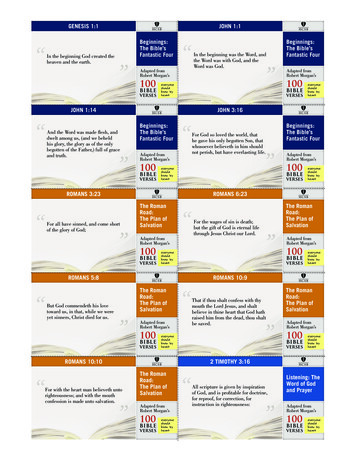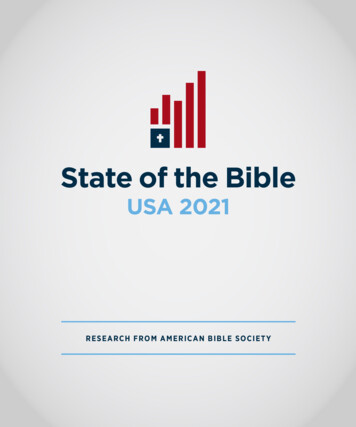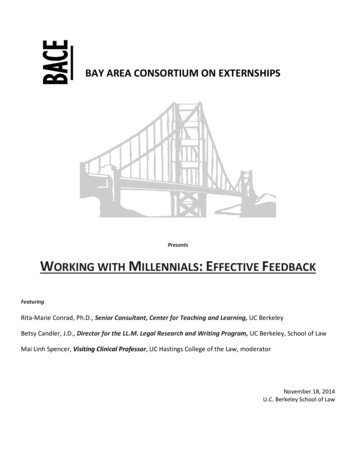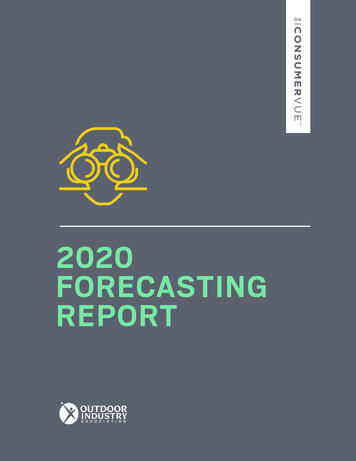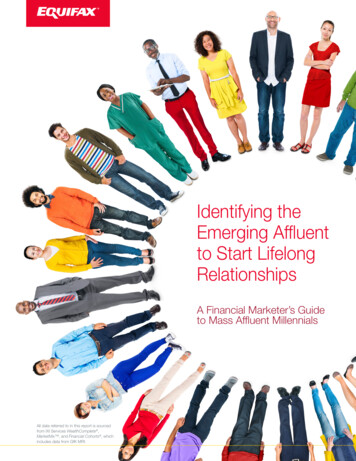
Transcription
Digital Millennials and the BibleDigitalMillennialsand the Bibleproduced in partnership with Barna Group1
Research commissioned byBible SocietyDesigned by CODEC at University of DurhamConducted by ComResAnalysis by Barna GlobalCopyright 2018 by Bible SocietyThis report was produced by Barna Group for Bible Society, Swindon, UK. The informationcontained herein is confidential and belongs solely to Bible Society. It may not bereproduced in any form or format without the written permission of Bible Society.
Digital Millennials and the Bible3INTRODUCTIONBible Society’s mandate is to help people engage with the Bible, because we believe that when people do so,lives can change, for good. In the many parts of the world where Bible Society works, the primary barrier isavailability. Here in the UK, the Bible is readily accessible, but its perceived irrelevance is a common hindrance toengagement. Millions of British young people have grown up without much exposure to Christianity or the Bible.In this context, Bible Society desired to conduct a landmark study of Bible perceptions and engagement amongMillennials—adults ages 18–35. We partnered with CODEC at the University of Durham to design the researchand with Barna Global to produce this report. Some of the findings you will encounter in the following pagesmay surprise you.For example, given the societal context, we expected to find widespread scepticism or even hostility towardsChristianity and the Bible among those unconnected with the Church. Yet this study uncovered that attitudes aremore likely to be neutral than negative among young people, affirming Bible Society’s mission to help societyfind relevance and see the value in the Bible.We also learned that familiarity with the Bible does not predict application of Scripture to one’s life. Plenty ofyoung adults label the Bible ‘God’s Word’ and claim some familiarity with its contents, but only a fraction, evenof self-described Christians, consider it an authoritative truth for their lives—most commonly those who attendchurch regularly.So how do Millennials engage with the Bible, when they do engage? This was a very important component ofour research, as we expected this highly tech-savvy generation (96% of whom own an electronic device and usesocial media regularly) to eschew a historically print book. In fact, we found that print is not dead—at least notyet. Despite a surge in electronic media, over half of ‘digital Millennials’ mainly read books in print. Further, moreyoung-adult Bible users prefer a print copy of the Bible to a digital version, though plenty do use a phone-basedapp or search for Scripture online.These are some of the surprises we found in this study of Digital Millennials and the Bible. Many more insightsabout digital engagement and opinions about faith and religion are contained in this report. We invite you toconsider these findings in light of your own experiences with young people. Some may see these results as abit rosy (our analysts note that Millennialsgenerally do tend to rate things morepositively than older adults), yet attitudestoward the Bible seem rather clear andunsceptical.Where do you see opportunities to share thehope and truth of the Bible based on theseresults? What might you do differently tobetter connect with Millennials? How mightthese insights change your approach toevangelism? Our hope is that this informationwill assist those who interact with youngadults inside and outside the Church toengage with them in a way that is relatableand life-changing.
Digital Millennials and the BibleMETHODOLOGYThis report contains research conducted with Millennials (adults aged 18 to 35) in the UK, who qualify as ‘DigitalMillennials’ – those who own at least one electronic device (tablet or mobile) and who use social media at least weekly– for which 96% of this age cohort qualify.* Given the prevalence of young adults who own devices and log into socialmedia on a weekly basis, in this report, ‘Digital Millennials’ are referred to simply as ‘Millennials.’The survey was designed by CODEC at University of Durham and conducted online via a consumer panel by ComRes[16-30 Nov 2016]. A total of 1,942 Millennials completed the survey, and minimal weighting was applied to ensure thedata are nationally representative. At a 95% confidence interval, data for this sample size have a 2.2% margin of error.In several of the sections on ranked options, this report presents not only the top choice but the top three choices. Whilethe top-ranked options show primary choices, the top three ranked often gives a better idea of overall popularity.GroupsTo show the relationship between Millennials and the Bible indetail, this report will refer to several faith groups that have distinctresponses.Christians include all Millennials who responded to, ‘Which of thefollowing religious groups, if any, do you consider yourself to be amember of?’ by selecting, ‘Christian.’ This group make up 35% of thesample of Digital Millennials.Nones include all Millennials who responded to, ‘Which of thefollowing religious groups, if any, do you consider yourself to be amember of?’ by selecting, ‘No religion.’ This group make up 48% of thesample of Digital Millennials.Others include all Millennials who responded to, ‘Which of thefollowing religious groups, if any, do you consider yourself to be amember of?’ by selecting, ‘Muslim,’ ‘Hindu,’ ‘Buddhist,’ ‘Sikh,’ ‘Jewish,’ and‘Other.’ Others include 14% of the sample of Millennials.Practising Christians are Christians who say they attend church atleast monthly. Approximately half (47%) of Christians and 17% of thetotal sample are practising Christians.Non-practising Christians are Christians who attend church lessfrequently than once a month or not at all. About half (53%) ofChristians and 19% of the sample are non-practising Christians.*Of 2,015 Millennials surveyed by ComRes, 1,942 owned at least one digital device and usedsocial media at least weekly. This study reports the data of those 1,942 ‘Digital Millennials.’4
Digital Millennials and the Bible5MILLENNIALS ‘IN THE MIDDLE’ON CHRISTIANITY AND THE BIBLEMore neutral than negative feelings aboutChristianity among MillennialsThe most common Millennial response to religion in general and Christianity in particular is a neutral response or noneat all. Fewer than half of UK Millennials (41%) have a net positive view of Christianity and of the Bible, yet only one inseven has a negative view (15%).Perhaps unsurprisingly, Christians are most likely to look favourably upon Christianity, 70 percent doing so. The groupleast likely to see Christianity favourably are the Nones, 20 percent of whom have a positive view and 23 percent ofwhom have a negative view of Christianity; the majority are somewhere between the two, saying either they don’tknow what their feelings are toward Christianity (7%) or that they have a neutral view (50%).How would you describe your feelings towards 50%25%31%36%16%16%4%UK MillennialsVery PositiveFairly Positiven 1,942 Digital MillennialsNonesNeither Positive nor Negative11%Other ReligionDon’t KnowChristianFairly NegativeVery Negative
Digital Millennials and the Bible6This is not a ringing endorsement of Christianity, but compared with other religions, Christianity is still perceivedas positively as any other. Christianity (at 41%) is statistically tied with Buddhism (38%) for positive feelings. Otherreligions lag behind in perceptions, although few have more negative responses from Millennials.How would you describe your feelings towards each of the following religions?8%6%9%Very Positive16%18%5%Christianity10%8%25%Fairly PositiveOther Religion7%39%Neither Positive nor NegativeDon’t KnowFairly NegativeVery Negative48%n 1,942 Digital MillennialsSacred texts elicit similar responses as religions in general, with the Bible eliciting the most positive feelings.Millennials have the most negative feelings towards the Qur’an (28%), followed by the Bible (16%). They are halfas likely (6%) to say they don’t know the Bible as to say they don’t know other sacred texts, except the Qur’an. Thissuggests most Millennials believe themselves to be familiar with the Bible, and their feelings about it are based on abelief that they know its content—at least in general.How would you describe your feelings towards each of the following sacred texts?7%9%e Bi ble6%Th14%15%40%23%Very PositiveFairly PositiveFairly NegativeNeither Positive nor NegativeDon’t KnowVery Negative50%n 1,942 Digital Millennials15%r Religious texts8%7%Othe7%
Digital Millennials and the Bible7MILLENNIALS ‘IN THE MIDDLE’ ON CHRISTIANITY AND THE BIBLE //Relationship with the Bible next tonon-existent for mostDespite positive or neutral feelings, about half of young UK Millennials (48%) say they don’t have a ‘relationship withthe Bible’ – including 22 percent of Christians and 71 percent of Nones. In addition, 14 percent say their relationshipwith the Bible is ‘minimal,’ including 17 percent of Christians and 11 percent of Nones.Which of the following statements, if any, best describes your relationship with the Bible?ExcitingVery closeDon’t have one5%23%6%4%4%2%5%Coming to an end2%2%5%37%Interested – but don’tknow where to startIt’s complicatedMillennialsNon-practising Christians48%2%2%1%14%MinimalJust 1%11%Practising Christiansn 1,942 Digital MillennialsOne in eight Millennials (13%) has a clearly positive relationship with the Bible; they characterise it as ‘exciting’ or ‘veryclose.’ A smaller group choose negative characteristics for their relationship with the Bible, with 8 percent saying it iseither ‘broken,’ ‘coming to an end’ or some other negative descriptor.
Digital Millennials and the Bible8MILLENNIALS ‘IN THE MIDDLE’ ON CHRISTIANITY AND THE BIBLE //To many, the Bible is ‘God’s Word’ but notnecessarily authoritative truthPerceived characteristics of the Bible vary greatly, with the most commonly chosen being ‘Word of God,’ selected by 29percent of all Millennials.At least one in five chooses ‘historical’ (24%) ‘myth’ (22%), and ‘moral guide’ (21%) as one of three words to describe theBible.Which of the following words or phrases do you most associate with the ’s Revelation40%Word of ePoetryDauntingChristiansOther religionMoral GuideChallengingNonen 1,942 Digital MillennialsNearly half (44%) of Christians chose ‘Word of God’ as one of the top three words to describe the Bible. This is followed,at a distance, by ‘moral guide’ and ‘wisdom,’ each with 27 percent. A quarter of Christians (24%) describe the Bible as‘Truth.’Nones’ responses are often the inverse of Christians’ responses. For example, among Nones, the most commonresponse, at 36 percent is, ‘myth.’ Eight percent of Christians chose this characteristic.These choices, combined with the majority of Millennials who say the Bible does not have supreme authority in theirlives, indicates that ‘Word of God’ is more of an epithet than an indication of faith or belief in the authority of Scripture.
Digital Millennials and the Bible9MILLENNIALS ‘IN THE MIDDLE’ ON CHRISTIANITY AND THE BIBLE //Most practising Christians say the Bible issupreme authorityOver a third (38%) of all Christian Millennials agree, ‘The Bible should have supreme authority in guiding my beliefs,views and behaviour.’ Practising Christian Millennials agree at a much higher rate, 61 percent.The Bible should have supreme authority in guiding my beliefs, views and n’t knowNot applicable30%15%2323%20%4Completely true (5)12%9%13%1 - Not at ristiansNon-PractisingChristiansn 1,942 Digital MillennialsNon-practising Christians are unlikely to agree (19%) and are more likely to disagree (39%) than to choose a neutralresponse (23%). In other words, Christians who aren’t attending church also don’t see the Bible as a supreme authorityin their lives.Non-Christians’ and nones’ receptivityThose with no religion, rather than a non-Christian religion, are more likely to have a negative view of the Bible andChristianity. While 42 percent of non-Christian religious people have a positive view of Christianity, only 20 percentof Nones do. Furthermore, while 23 percent of Nones have a negative view of Christianity, only 18 percent of nonChristian religious do.This pattern holds throughout the study. It should not be taken to mean that religious people who are not Christianshave loosely held religious beliefs; rather, they are more comfortable with the idea of religion in general compared tothose without a religion, or their faith may incorporate some of the teachings of the Bible itself.Nones, in addition to having fewer positive and more negative responses to Christianity and the Bible, also have moreneutral responses; half say their view of Christianity (50%) and the Bible (51%) is neither positive nor negative. Thismay indicate a ‘policy’ toward religion or Christianity, mixed positive and negative feelings, or a lack of context andfamiliarity.
Digital Millennials and the Bible10MILLENNIALS ‘IN THE MIDDLE’ ON CHRISTIANITY AND THE BIBLE //Spiritual-but-not-religious has limited appeal forMillennialsMillennials who are not religious tend not to be interested in spirituality (defined as ‘connecting to the Divine,’ aquestion shared with the 2008 European Values Study) at all. Meanwhile, a large group of Christian Millennials alsoseem not to have a spiritual life apart from church services.In the European Values Study, the same question with similar response options (though lacking the ‘don’t know’option) shows that young people aged 15 to 34, at 34 percent, are less likely than older UK adults, at 45 percent, to saythat it’s somewhat or very true (selecting a 4 or 5 / ‘very much’) that they connect to the Divine without churches orreligious services. The proportion that select a neutral response is similar for both age groups, at about a quarter (27and 23 percent). Younger adults are more likely to disagree that they have a way of connecting to the Divine withoutchurches or religious services, at 40 percent, compared to older adults’ 32 percent.Taken together, these trends could mean that ‘connecting to the Divine,’ outside of religious practises, does not holdthe respect or interest of Millennials. Alternatively, it could mean that their idea of spiritual life does not have much todo with God or the Divine. Popular writer Brene Brown defines spirituality as ‘recognizing and celebrating that we areall inextricably connected to each other by a power greater than all of us,’ explaining the idea that spirituality may bemore about connections to other beings than a Divine being.‘I have my own way of connecting with the Divine without churches or religious services’15%16%15%8%9%7%8%6%9%All Millennials26%8%Non-Religious Millennials3220%36%Very much (5)425%17%22%22%9%8%6%8%Christian MillennialsNot at all (1)Not applicableDon’t known 1,942 Digital MillennialsIn this survey, the 16 percent of non-religious Millennials who agree strongly or somewhat that they have a way ofconnecting with the Divine apart from churches or religious services may be said to be ‘spiritual but not religious’ – atotal of just eight percent of the generation.Both the 36 percent of Nones who say the question does not apply and the 25 percent who strongly disagree couldbe both non-religious and non-spiritual, making the composition of the non-religious group mostly (63%) Millennialswho do not believe connecting with the Divine is part of their lives.Notably, many Christians (23%) affirm they do connect with the Divine apart from church or religious services. In theircase, they are both religious and spiritual, possibly praying, reading the Bible, or doing other activities to connect withGod on their own, outside of church services.The 15 percent of Christians who either say the question doesn’t apply or who strongly disagree may be said to bereligious but not spiritual—a group larger in size than the spiritual-but-not-religious Nones.
Digital Millennials and the BibleMILLENNIALS ‘IN THE MIDDLE’ ON CHRISTIANITY AND THE BIBLE //Concluding thoughts on perceptions ofChristianity and the BibleIn this survey, results showed a pattern of neutral responses to religion, spirituality and sacred texts, especially amongnon-religious Millennials. In particular, Christianity and the Bible are not generally loved or hated.This is not to say that UK Millennials will be unwilling to criticise Christianity or the Bible. The quarter (23%) of Noneswith a negative perception of Christianity may indeed make themselves heard.However, to this generation in this era, Christianity is no more reviled than other religions. This may be becausereligion is playing a smaller role in this generation’s upbringing and behaviour than in previous generations. In thenext section, we will examine behaviours more closely.In other studies that include older generations, Christian practice has dropped overall. According to the 2015British Social Attitudes Survey, reported on by British Religion in Numbers (BRIN1), while a majority of Millennialssay they had a religious upbringing (37% of young Millennials and 31% of older Millennials say they did not have areligious upbringing), the number who were raised Anglican has nearly halved since the previous generation (55%to 29%), implying far less familiarity with the Church of England and its teachings. Those raised in other Christiandenominations have not seen the same dramatic decline.Again looking at the 2015 British Social Attitudes Survey, reported on by BRIN1, 18 percent of Anglicans, 40 percent ofCatholics and 34 percent of other Christians attended church once a month or more, meaning a minority even of thosewho affiliate with Christianity connect with a congregation on a regular basis.In this study, a majority (53%) havenot attended church in the pastyear, and about as many (47%) saythey have not engaged with theBible at all in the past year.While these three indicators—upbringing, attendance and Bibleengagement—are not the wholestory of Millennials’ engagementwith Christianity, the content ofChristianity and the Bible likelyfeel increasingly unfamiliar to thisgeneration. At the same time,Millennials, who have less exposureto Christianity and the Bible, maybe ready for a fresh encounter withthe Bible.1. Religion and the British Social Attitudes 2015 Survey, as posted January 9, 2017 by Ben Clements, www.brin.ac.uk.11
Digital Millennials and the Bible12BEHAVIOURS: ENGAGEMENTWITH THE BIBLEFrequency of engaging with the BibleAbout half of UK Millennials (47%) say they never engage with the Bible. This leaves a majority of Millennials whointeract with the Bible at least annually.Over the past year, how often have you read, listened to or engaged with the 4% 5%11%13%47%15%13%69%13%6%7%17%13%DailyA few times a weekAbout once a weekAbout once a fortnightAbout once a monthA few times a yearAbout once a yearNever21%n 1,942 Digital MillennialsUnsurprisingly, Millennial Nones engage with the Bible even less frequently than their peers. Seven in 10 of themnever engage with the Bible. Fewer than one in 10 (9%) interact with the Bible more than a few times a year. However,for about a third of Nones (31%), there are touchpoints with the Bible once a year or more.
Digital Millennials and the Bible13BEHAVIOURS: ENGAGEMENT WITH THE BIBLE //The Bible is primarily used for comfort orinspirationAll Millennials who engaged with the Bible in the past year are most likely to say that getting comfort and inspirationare why they sought it out.Practising Christian Millennials engage with the Bible for a variety of reasons different than non-practising ChristianMillennials. They say they mainly engage with the Bible for inspiration (39%), because it brings them closer to God (37%),for comfort (34%), because they enjoy reading it (30%), and because they are Christians (30%). These reasons indicatethat practising Christians are more likely to read the Bible from internal motivations, rather than from duty or ritual.For non-practising Christians, the most common reason to engage with the Bible is a special church service. A third (38%)rank it among their top three reasons. Another third say they engage with it for comfort (32%) or inspiration (32%).Which of the following reasons, if any, explain your reasons for engaging with the Bible in thelast year?29%To inspire me32%30%34%32%To comfort meI feel it brings me closer to GodI think it is an important part of being a Christian20%I was at a regular church serviceI enjoy reading itI was at a special church service (e.g., wedding, funeral)For ethical / moral directionTo prepare for church or para-church activities (e.g., Bible study)I had to read it for my studiesI had to read it for my jobMillennialsPractising Christians37%16%18%For general guidance / 1%20%23%11%15%9%16%11%12%12%10%8%Non-Practising Christiansn 1,021 Digital MillennialsTo nearly three-quarters of UK Christian Millennials (73%), being a Christian is not the main reason to read the Bible.Only 27 percent lists this as one of the top three reasons, of all their reasons to engage with the Bible.
Digital Millennials and the Bible14BEHAVIOURS: ENGAGEMENT WITH THE BIBLE //Context of Bible engagement: homeHome is one of the top two contexts for Bible engagement. A quarter of Millennials who engaged with the Bible inthe past year did so primarily at home; 25 percent ranked this first. Looking more broadly, by including the top threecontexts where Millennials engage with the Bible, half of those who engage with the Bible do so at home (49%),coming out at about the same rate as engaging with the Bible at a special church service (48%).The prevalence of Bible engagement at home is stronger among Christians. Christians are more likely than nonChristians to rank reading at home as their primary form of Bible engagement; 31 percent of Christians ranked homefirst, compared to 21 percent of other religious groups and 18 percent of Nones.These differences are strikingly larger when looking at the top three contexts for Bible engagement. Almost two-thirdsof practicing Christians (63%) and half (54%) of non-practising Christians engage Bible at home.In which of the following places, if any, have you read, listened to or otherwise engaged withthe Bible over the last year?25%At homeAt a special church service48%12%At a regular church serviceSightseeing in a church / cathedral8%At school, college or university8%40%34%29%5%At someone else’s home26%6%On a journey25%5%At an informal church gathering22%8%In hospitalOther49%22%1%Top Choice of Millennial Bible Engagers20%7%Top-Three Choice of Millennial Bible Engagersn 1,021 Digital Millennials who engaged with the Bible at least once in the past yearFor Nones who have engaged with the Bible, home is a less likely context for encountering the Bible, with a third (35%)engaging with the Bible at home, 29 percent of Nones engaging with it at a regular church service, 42 percent engagingwith it while sightseeing at a church and the majority—61 percent—engaging with the Bible at a special church service.Among Millennials who have read, listened to, or otherwise engaged with the Bible over thelast year, where? At home ranked in top n 1,021 Digital Millennials who engaged with the llennial35%Nones
Digital Millennials and the Bible15BEHAVIOURS: ENGAGEMENT WITH THE BIBLE //Context of Bible engagement: special eventsThe most common primary reason for non-Christians to encounter the Bible is a special occasion such as a wedding orfuneral. Twenty-two percent of Millennials said it was their top reason for engaging with the Bible, and 48 percent saidit was one of their top reasons.Of Millennials who are religious but not Christian, a third (32%) who engaged with the Bible did so mainly because of aspecial occasion. Of Nones, 61 percent encountered the Bible mainly because of a special occasion.Engaged with the Bible at a special church service(e.g. wedding or funeral ranked in top 3 among Millennials who have read, listened to, or otherwiseengaged with the Bible over the last gion61%Nonesn 1,021 Digital Millennials who engaged with the BibleOverall, Millennials who engage with the Bible are about as likely to do so at home as at a church event, like a weddingor a funeral (49% at home, compared to 48% at an event). Christians are most likely to engage with it at home (59%).Nones are nearly twice as likely to encounter the Bible at a church event than at home (61% at an event, compared to35% at home).Concluding thoughts on Millennialbehaviours and the BibleLife stagevs. ageWhile Bible engagement among Millennials is sparse, it also offers some keyopportunities. First of all, half of all Digital Millennials do engage with the Bibleat least annually, both on their own and in the company of others.When it comes to the number oftimes people engage with the Bible,having kids at home correspondswith more Bible interaction; aging isgenerally correlated with less Bibleinteraction, but has less of an impactthan parenthood. Similarly, regardingopinions on Christianity, havingchildren is correlated with higherpositivity, though those with childrenin the Millennial age group skewtowards self-identifying as Christian.In addition, these encounters are often in churches at special events,where Millennials will also see how officiants apply the Bible’s principlesand explain what Christianity has to say about major life events—and theirgreater context.For the half of Millennials who engage with the Bible at home, there isan opportunity to help them connect with the comfort, inspiration andguidance many of them are looking for.
Digital Millennials and the Bible16BEHAVIOURS: ENGAGEMENT WITH THE BIBLE //Parenthood and religious practiceBeing a parent of a child aged five or under often makes a difference in how a Millennial answers a question aboutfaith and the Bible.Just over a quarter (27%) of people in this sample of Millennials has children. Nones are less likely (18%) than religiouspeople (35% of Christians, 37% of other religious people) to have children, as are non-practising Christians (29%,compared to 42% among practising Christians). Parents of children aged five or under are more likely to be religious thannon-parents. The presence of young children is linked to religious practice, though it is important not to conclude thathaving children causes one to be more predisposed to considering Christianity.Religious profile of parents of young children3%3%31%ChristianOther religionUnder 532%nts of ChilPrefer not to ent among parents of young childrenChurch: Parents ofChildren Under 5Bible: Parents ofChildren Under 5Bible: Others9%4% 7%3%3%2%Church: Others9%9%13%4% 5% 6% 4% 4%15%5% 5%15%10%10%11%5%14%6%37%59%7%12%9%35%52%15%DailyA few times a weekAbout once a weekAbout once a fortnightAbout once a monthA few times a yearAbout once a yearNevern 1,942 Digital MillennialsParents of children aged five and under are also more engaged in both church and the Bible. While a majority ofMillennials with no children under five neither attend church (59%) nor engage with the Bible (52%), just over a thirdof Millennials with children under five do not attend church (37%) or engage with the Bible (35%).
Digital Millennials and the Bible17THE BIBLE IN THE DIGITAL SPACE:PRINT IS NOT DEADDigital Millennials read print booksIn what format do Millennials prefer to engage with the Bible? First, a look at general media consumption habitsprovides some context. Despite the surge in electronic media, print appears to be alive and well, even amongMillennials, a tech-savvy generation.A majority of Millennials (58%) say they mostly read books in print. A quarter say they read print and digital formatsequally (24%), leaving a minority of 18 percent who mostly read books in digital formats.How UK Millennials usually read books24%Mainly read books in print58%18%Mainly read books digitallyRead both formats equallyn 1,942 Digital MillennialsMillennials who considerthemselves Christians,including those whoactively practise theirfaith, are as likely as otherreligious groups to readany book in print.
Digital Millennials and the Bible18THE BIBLE IN THE DIGITAL SPACE: PRINT IS NOT DEAD //Millennials favour a print BibleThe Bible, specifically, is more appealing to young people in print than in digital format (47%, vs. 28%, respectively). Womenespecially prefer print (50%, versus 24% digital), while more men favour a digital Bible (43% print and 31% digital).Of those who engaged with the Bible in the last year, Millennials were most likely to have picked up a print copy.Top way of interacting with the BibleChristianOtherNoneAll respondents who have engaged with the Bible at least once in the past year – top 35%6%Searched on an eReader / tablet8%4%Read / watched / listenedon an eReader / tabletRead / watched / listenedvia a smartphone appI don’t know12%24%26%12%4%6%3%25%16%6%7%6%Read / watched / listened on alaptop or desktop computer25%7%8%5%3%44%38%7%7%7%Searched on a laptop ordesktop computerSearched on a smartphone20%14%12%16%Listened to someone else in theroom read the Bible out loudListened to it or watched the
Digital Millennials and the Bible 7 Relationship with the Bible next to non-existent for most Despite positive or neutral feelings, about half of young UK Millennials (48%) say they don't have a 'relationship with



